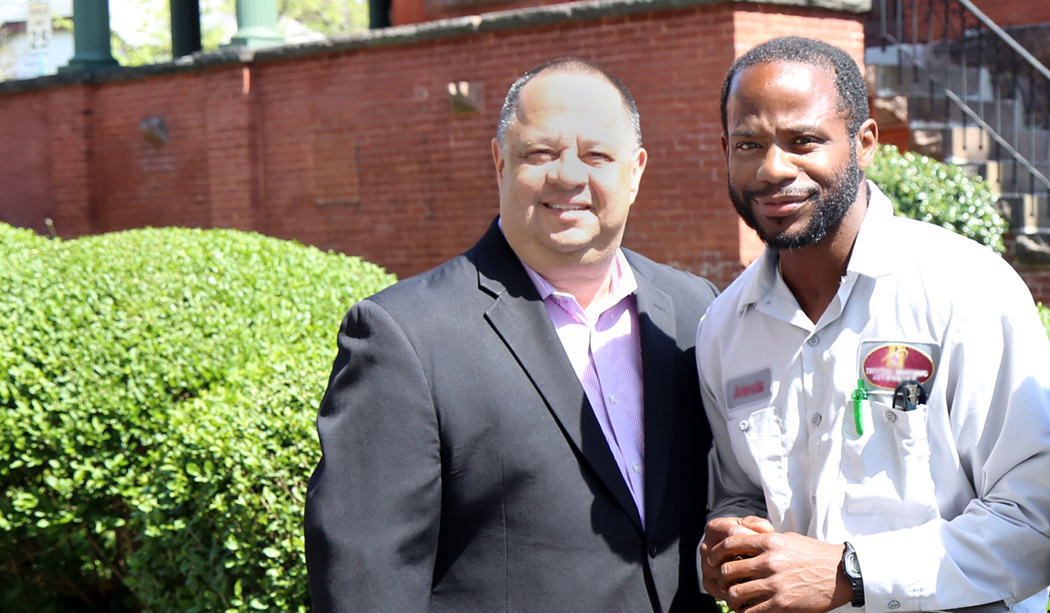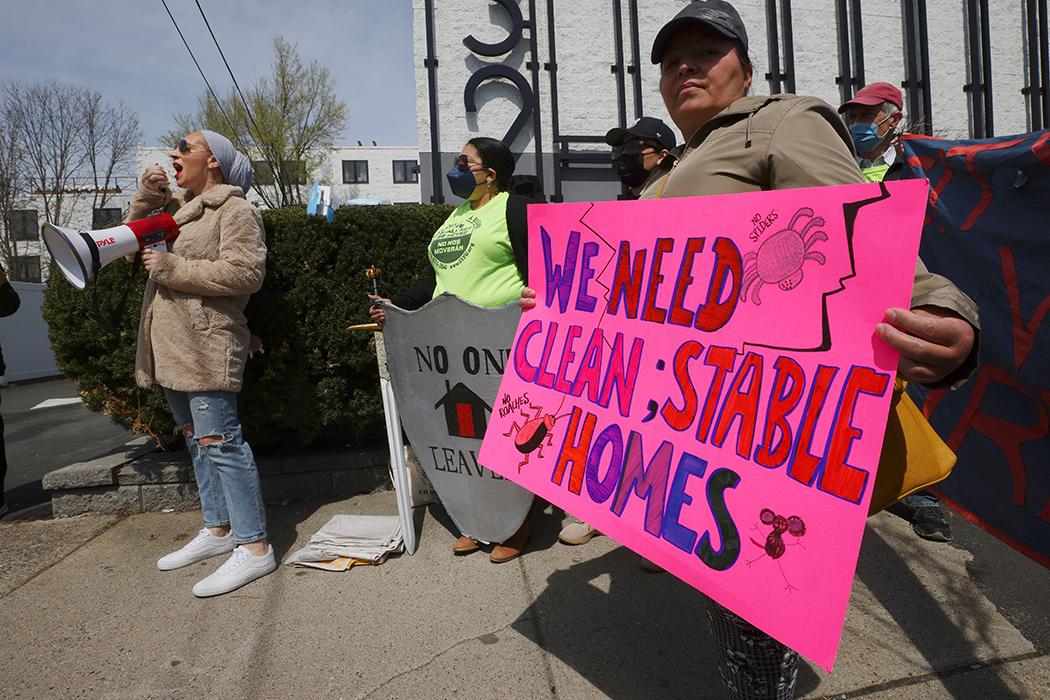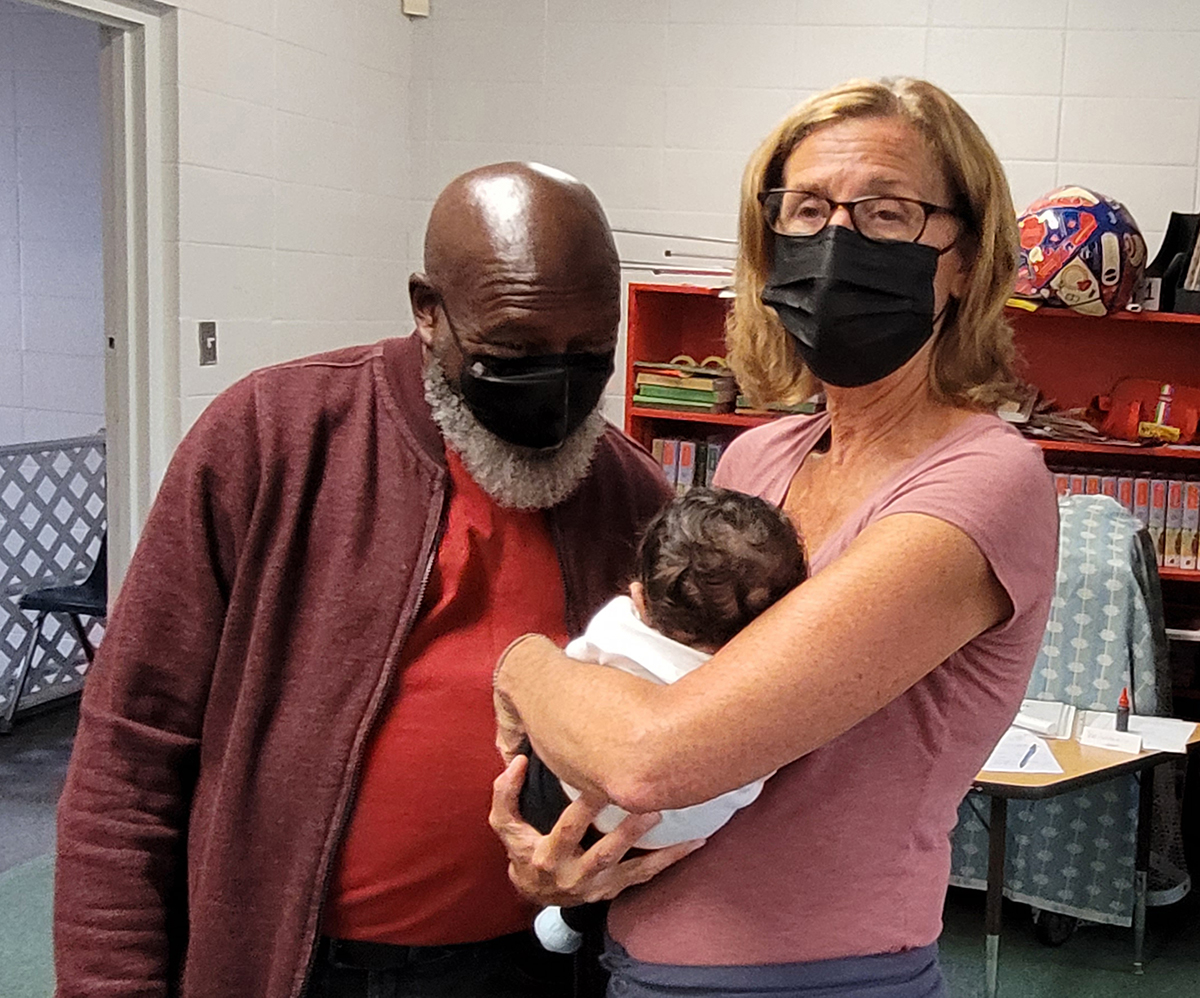On the Margins
Diocese’s Catholic social service groups strive to assist those in need of affordable housing
October 5, 2023 at 8:20 a.m.

The Son of Man, it seems, is not the only one who has no place to lay his head.
Access to affordable housing is on the endangered-species list throughout the nation, including in New Jersey and the Diocese of Trenton. The reasons are many. A pandemic-based moratorium on evictions has ended. Rents are rising. Some people don’t have the money. Others have returned from jails. Some New Jersey cities continue to defy a state Supreme Court ruling mandating that every municipality build its “fair share” of low-income housing.
The Diocese and its social service groups strive to hold the line, advocating for those in danger of losing their dwellings while waiting for structural reforms that would ease the burden.
Brenda Rascher, executive director of the Office of Catholic Social Services in the Diocese and a former legal services attorney who specialized in housing law, estimates that there are “probably at least a dozen” programs that her office works with or tracks that deal with the needs of those confronted with homelessness.
In the four-county Diocese of Trenton, there are indeed some who are “absolutely homeless,” as Rascher put it. “Another piece of those homeless experiences are people who have the ability to maintain an apartment but cannot find an apartment they can afford. ... The housing market is almost causing people to have to stay homeless,” she stated.
In other cases, “we have a lot of people who are at-risk (of becoming) homeless” because landlords are “raising the rents,” Rascher said. Also, “we have people with Section 8 (housing) vouchers and landlords are refusing to negotiate” to rent them a place to live within that program’s rental guidelines.
Illegalities have also crept into the picture. “They charge exorbitant rent for substandard housing. Tenants are afraid to do anything because a substandard house is better than none,” Rascher said. “I have a woman whose landlord has said, ‘I’m not renewing your lease because I want more rent.’ That’s illegal to do in New Jersey.”
This may seem puzzling, since Rascher puts New Jersey among the top three states in the nation for tenant protections. “The problem is tenants don’t know their rights, and a lot of landlords are incredibly skilled at preventing tenants from asserting their rights,” she said.
Rents in central New Jersey are up as much as 30% over year-ago levels. “Basically, a landlord does that by evicting the current tenant, and the new tenant pays 30% more,” according to Rascher.

Arnold “Val” Valentin, left, an area director for Catholic Charities’ Community Services, takes a few moments to catch up with Alexis, a client of the Returning Citizens to the Community Program. Catholic Charities’ courtesy photo
Parishes Respond
Locally-based St. Vincent de Paul conferences are often called upon to pay for many different things to get people back up on their feet: utility bills, food, car repairs, tuition, emergency supplies, medicine. But for the Our Lady of Perpetual Help Conference, based in Highlands and covering Sea Bright, “the vast amount we pay is for rent,” said Alan Tedesco, a conference board member. “It’s one of the things we can do to prevent homelessness.”
For the first two-and-a-half years of the pandemic, evictions were put on hold and government funds were available to help those in need. Now, “the amount of money we spent has tripled from the previous year,” Tedesco said. “The moratoriums are gone, evictions are totally legal, the government funds have stopped.”
Here’s a sample of how the Our Lady of Perpetual Help Conference has helped so far this year:
• A family in Section 8 housing fell many months behind on rent. The landlord was charging late fees – illegal when Section 8 is involved. Working with South Jersey Legal Services, the late fees were removed and the back rent paid.
• One person owed $3,660 for fourth-quarter property taxes – a great-great grandmother who raised her grandchildren, great-grandchildren and a great-great grandchild. “We put together a package of funds to pay her taxes and we got budget counseling for her,” Tedesco said.
• One couple needed only $450 to avoid eviction. They were out of work because they had both been hospitalized.
Tedesco had details of at least a dozen cases at his fingertips. The combined population of Highlands and Sea Bright barely scrapes 6,000. Yet, St. Vincent de Paul – before August was over – had already paid $34,000 in rent arrearages, support made possible through the generosity of OLPH parishioners.
Along with the OLPH, St. Vincent de Paul Conferences of St Dorothea in Eatontown and Christ the King in Long Branch have offered a workshop series, “Getting Ahead,” attacking the underlying causes of poverty. “We always try to look at somebody as having a path forward,” Tedesco said. “Job leads, increasing part-time working hours. We know that Shop-Rite might be hiring, Home Depot might be hiring.”
“Getting Ahead” can handle up to 10 financially struggling neighbors. It’s a 16-month 15- to 20-session program spread over several months. Participants typically meet once a week and they’re paid to attend. “They have lunch and basically they learn how to analyze causes for their financial hardships and their poverty,” Tedesco said. “There’s group discussion and there’s exercises ... but at the end they come up with an action plan” to keep poverty at bay.
Combatting Long-standing Challenges
Housing access is “a structural problem that has been brewing in New Jersey for decades,” said Marlene Lao-Collins, Catholic Charities of Trenton’s executive director. “Despite legal measures like the ‘Mount Laurel Doctrine,’ there has been a lack of development of low-income housing. This has had a tremendous, cumulative effect over the years.”
The New Jersey Supreme Court in 1975 established the Mount Laurel Doctrine by banning exclusionary zoning and ruling that each municipality in the state had to put up its “fair share” of housing for low-income residents. Forty-eight years later, some places still resist. Some stall, some sue, some pay other towns to erect affordable housing in their towns rather than in their own.

Housing rights activists and tenants protest against evictions and the poor condition of their apartments outside the offices the landlord Broadway Capital in Chelsea, Mass., April 25, 2022. OSV News photo/Brian Snyder, Reuters
Pooling resources helps stretch finite dollars. Supporting groups with specific expertise also helps avoid duplicating services.
“We are proud to be a part of the Trenton/Mercer Continuum of Care, which is a consortium of social service organizations working in the municipalities and Mercer County to address homelessness and mitigate as effectively as possible the trauma and disruption that being unhoused causes,” said Arnold “Val” Valentin, who oversees housing and homeless initiatives for Catholic Charities.
Catholic Charities’ Community Services team participated in the Mercer County portion of the annual “Point in Time” survey, which documents the number of homeless individuals who were counted on one day in January,” Valentin said. In the Diocese’s four counties, Burlington County has 933 unhoused people; Mercer County, 714; Monmouth County, 483, and Ocean County, 434.
Catholic Charities maintains a Returning Citizens to the Community Program with funding from the Mercer County Department of Human Services. This service is intended to help those released from prison in finding work and a place to live.
Alexis, one of the program’s clients, in a phone interview with The Monitor, spoke of the “debt crunch” he encountered when trying to make it on his own. Now, with RCCP’s help, “I’m pretty much caught up.”
A Trenton native, Alexis now has both a job and a home. The latter is a one-bedroom apartment with rent at $950 per month. Knowing just what to do after having been removed from the rest of society can be hard, but with Catholic Charities’ help, he said, “it was very helpful and easy.”
“Bishop (David) O’Connell has been incredibly supportive of our Community Services Program,” Valentin said. “The Diocese has provided funding that we are able to funnel directly to people in need through our parish services program. We also partner with the Diocese on our parish counseling services.”
Valentin also mentioned Catholic Charities partners with Monmouth County, in administering Linkages, a program that provides temporary housing to individuals and families facing homelessness.
Even food pantries have a role to play, as they lessen the chance that a family is forced to choose between putting food on the table or a roof over their heads.
Still, beyond the Diocese’s scope is “creating the level of affordable housing that is currently needed,” Lao-Collins said. “There are also individuals who may be new to our country who do not qualify for housing assistance; we do not have the resources to be able to help them. But we are engaged where we can be to help address this ongoing issue.”
If solving homelessness and lack of housing access is everyone’s problem, Lao-Collins is waiting for Congress to do its part.
“Right now, the biggest concern is the federal budget and the idea of cutting back on programs to remain under the debt ceiling,” she said. “It is the responsibility of our elected officials to support the needs of the homeless and people with behavioral health issues. The U.S. Dept. of Housing and Urban Development’s Worst Case Housing Needs report really underscores the need for safe, affordable housing for our most vulnerable populations.”

With colder temperatures approaching, a number of parishes are gearing up to support community housing programs. One program, run by Interfaith Family Services (formerly known as Interfaith Hospitality Network in Ocean County), engages communities of all faith traditions to assist struggling families with children by providing accommodations and meals for three to five families at a time, for one week, several times a year. Parishes that host families as part of the program include St. Joseph, Toms River; Our Lady of Guadalupe, Lakewood; St. Barnabas, Bayville, and Epiphany, Brick. Visitation Parish in Brick serves as a support community that provides needed items to the host congregations. In this 2022 picture, volunteer Pat Rainer tends to an infant staying at the facility located on the campus of Holy Family Parish, Lakewood. Mary Stadnyk photo
Related Stories
Friday, January 09, 2026
E-Editions
Events
The Son of Man, it seems, is not the only one who has no place to lay his head.
Access to affordable housing is on the endangered-species list throughout the nation, including in New Jersey and the Diocese of Trenton. The reasons are many. A pandemic-based moratorium on evictions has ended. Rents are rising. Some people don’t have the money. Others have returned from jails. Some New Jersey cities continue to defy a state Supreme Court ruling mandating that every municipality build its “fair share” of low-income housing.
The Diocese and its social service groups strive to hold the line, advocating for those in danger of losing their dwellings while waiting for structural reforms that would ease the burden.
Brenda Rascher, executive director of the Office of Catholic Social Services in the Diocese and a former legal services attorney who specialized in housing law, estimates that there are “probably at least a dozen” programs that her office works with or tracks that deal with the needs of those confronted with homelessness.
In the four-county Diocese of Trenton, there are indeed some who are “absolutely homeless,” as Rascher put it. “Another piece of those homeless experiences are people who have the ability to maintain an apartment but cannot find an apartment they can afford. ... The housing market is almost causing people to have to stay homeless,” she stated.
In other cases, “we have a lot of people who are at-risk (of becoming) homeless” because landlords are “raising the rents,” Rascher said. Also, “we have people with Section 8 (housing) vouchers and landlords are refusing to negotiate” to rent them a place to live within that program’s rental guidelines.
Illegalities have also crept into the picture. “They charge exorbitant rent for substandard housing. Tenants are afraid to do anything because a substandard house is better than none,” Rascher said. “I have a woman whose landlord has said, ‘I’m not renewing your lease because I want more rent.’ That’s illegal to do in New Jersey.”
This may seem puzzling, since Rascher puts New Jersey among the top three states in the nation for tenant protections. “The problem is tenants don’t know their rights, and a lot of landlords are incredibly skilled at preventing tenants from asserting their rights,” she said.
Rents in central New Jersey are up as much as 30% over year-ago levels. “Basically, a landlord does that by evicting the current tenant, and the new tenant pays 30% more,” according to Rascher.

Arnold “Val” Valentin, left, an area director for Catholic Charities’ Community Services, takes a few moments to catch up with Alexis, a client of the Returning Citizens to the Community Program. Catholic Charities’ courtesy photo
Parishes Respond
Locally-based St. Vincent de Paul conferences are often called upon to pay for many different things to get people back up on their feet: utility bills, food, car repairs, tuition, emergency supplies, medicine. But for the Our Lady of Perpetual Help Conference, based in Highlands and covering Sea Bright, “the vast amount we pay is for rent,” said Alan Tedesco, a conference board member. “It’s one of the things we can do to prevent homelessness.”
For the first two-and-a-half years of the pandemic, evictions were put on hold and government funds were available to help those in need. Now, “the amount of money we spent has tripled from the previous year,” Tedesco said. “The moratoriums are gone, evictions are totally legal, the government funds have stopped.”
Here’s a sample of how the Our Lady of Perpetual Help Conference has helped so far this year:
• A family in Section 8 housing fell many months behind on rent. The landlord was charging late fees – illegal when Section 8 is involved. Working with South Jersey Legal Services, the late fees were removed and the back rent paid.
• One person owed $3,660 for fourth-quarter property taxes – a great-great grandmother who raised her grandchildren, great-grandchildren and a great-great grandchild. “We put together a package of funds to pay her taxes and we got budget counseling for her,” Tedesco said.
• One couple needed only $450 to avoid eviction. They were out of work because they had both been hospitalized.
Tedesco had details of at least a dozen cases at his fingertips. The combined population of Highlands and Sea Bright barely scrapes 6,000. Yet, St. Vincent de Paul – before August was over – had already paid $34,000 in rent arrearages, support made possible through the generosity of OLPH parishioners.
Along with the OLPH, St. Vincent de Paul Conferences of St Dorothea in Eatontown and Christ the King in Long Branch have offered a workshop series, “Getting Ahead,” attacking the underlying causes of poverty. “We always try to look at somebody as having a path forward,” Tedesco said. “Job leads, increasing part-time working hours. We know that Shop-Rite might be hiring, Home Depot might be hiring.”
“Getting Ahead” can handle up to 10 financially struggling neighbors. It’s a 16-month 15- to 20-session program spread over several months. Participants typically meet once a week and they’re paid to attend. “They have lunch and basically they learn how to analyze causes for their financial hardships and their poverty,” Tedesco said. “There’s group discussion and there’s exercises ... but at the end they come up with an action plan” to keep poverty at bay.
Combatting Long-standing Challenges
Housing access is “a structural problem that has been brewing in New Jersey for decades,” said Marlene Lao-Collins, Catholic Charities of Trenton’s executive director. “Despite legal measures like the ‘Mount Laurel Doctrine,’ there has been a lack of development of low-income housing. This has had a tremendous, cumulative effect over the years.”
The New Jersey Supreme Court in 1975 established the Mount Laurel Doctrine by banning exclusionary zoning and ruling that each municipality in the state had to put up its “fair share” of housing for low-income residents. Forty-eight years later, some places still resist. Some stall, some sue, some pay other towns to erect affordable housing in their towns rather than in their own.

Housing rights activists and tenants protest against evictions and the poor condition of their apartments outside the offices the landlord Broadway Capital in Chelsea, Mass., April 25, 2022. OSV News photo/Brian Snyder, Reuters
Pooling resources helps stretch finite dollars. Supporting groups with specific expertise also helps avoid duplicating services.
“We are proud to be a part of the Trenton/Mercer Continuum of Care, which is a consortium of social service organizations working in the municipalities and Mercer County to address homelessness and mitigate as effectively as possible the trauma and disruption that being unhoused causes,” said Arnold “Val” Valentin, who oversees housing and homeless initiatives for Catholic Charities.
Catholic Charities’ Community Services team participated in the Mercer County portion of the annual “Point in Time” survey, which documents the number of homeless individuals who were counted on one day in January,” Valentin said. In the Diocese’s four counties, Burlington County has 933 unhoused people; Mercer County, 714; Monmouth County, 483, and Ocean County, 434.
Catholic Charities maintains a Returning Citizens to the Community Program with funding from the Mercer County Department of Human Services. This service is intended to help those released from prison in finding work and a place to live.
Alexis, one of the program’s clients, in a phone interview with The Monitor, spoke of the “debt crunch” he encountered when trying to make it on his own. Now, with RCCP’s help, “I’m pretty much caught up.”
A Trenton native, Alexis now has both a job and a home. The latter is a one-bedroom apartment with rent at $950 per month. Knowing just what to do after having been removed from the rest of society can be hard, but with Catholic Charities’ help, he said, “it was very helpful and easy.”
“Bishop (David) O’Connell has been incredibly supportive of our Community Services Program,” Valentin said. “The Diocese has provided funding that we are able to funnel directly to people in need through our parish services program. We also partner with the Diocese on our parish counseling services.”
Valentin also mentioned Catholic Charities partners with Monmouth County, in administering Linkages, a program that provides temporary housing to individuals and families facing homelessness.
Even food pantries have a role to play, as they lessen the chance that a family is forced to choose between putting food on the table or a roof over their heads.
Still, beyond the Diocese’s scope is “creating the level of affordable housing that is currently needed,” Lao-Collins said. “There are also individuals who may be new to our country who do not qualify for housing assistance; we do not have the resources to be able to help them. But we are engaged where we can be to help address this ongoing issue.”
If solving homelessness and lack of housing access is everyone’s problem, Lao-Collins is waiting for Congress to do its part.
“Right now, the biggest concern is the federal budget and the idea of cutting back on programs to remain under the debt ceiling,” she said. “It is the responsibility of our elected officials to support the needs of the homeless and people with behavioral health issues. The U.S. Dept. of Housing and Urban Development’s Worst Case Housing Needs report really underscores the need for safe, affordable housing for our most vulnerable populations.”

With colder temperatures approaching, a number of parishes are gearing up to support community housing programs. One program, run by Interfaith Family Services (formerly known as Interfaith Hospitality Network in Ocean County), engages communities of all faith traditions to assist struggling families with children by providing accommodations and meals for three to five families at a time, for one week, several times a year. Parishes that host families as part of the program include St. Joseph, Toms River; Our Lady of Guadalupe, Lakewood; St. Barnabas, Bayville, and Epiphany, Brick. Visitation Parish in Brick serves as a support community that provides needed items to the host congregations. In this 2022 picture, volunteer Pat Rainer tends to an infant staying at the facility located on the campus of Holy Family Parish, Lakewood. Mary Stadnyk photo



 Understanding Homelessness
Understanding Homelessness







